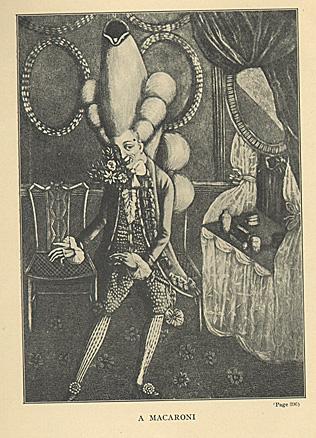I’m going to post a few pieces of text from the linguistic history trivia bits in my history podcast Historyzine
This is from episode 13.
Yankee Doodle came to town
Riding on a pony
Stuck a feather in his hat
And called it Macaroni.

I suspect many of our listeners from the US will probably have heard of the origins of this phrase. I think I’ve seen it mentioned on some of the TV programmes for children that we receive from the United States. However others may not, so for all of you I would like to talk about Macaroni.
The name Macaroni came from people who had been on ‘The Grand Tour’ and it became fashionable to refer to something that was Italian in style as very Macaroni. They gloried in carrying fashion to excess. The Macaronis would usually be extravagantly dressed often with narrow breeches and short tight waistcoats. These would be decorated with large buttons and possibly lace. Of course everyone would sport a large and extravant posey of flowers in their hands or pinned to the waistcoats. On their feet they would wear high heeled shoes and on their heads a small hat perched on the side of the head.
You would find a Macaroni hanging around the fashionable places of London or playing the highly fashionable card game ‘Faro’. This was a game at which one could very quickly win or lose vast fortunes and so many Macaronis gambled away their family fortunes at this game.
They quickly became a figure of fun to the media and I’ll summarise this with a quote from the book Georgiana by Amanda Foreman, You’ll find this quote on page 57 of the book.
‘The term ‘macaroni’ was coined to describe the fashionable young fops of the 1770s. The term probably originated in the 1760s when members of the short lived Macaroni club brought attention to themselves by their prediliction for all things foreign, especially food.Macaronis were much criticised in the press. The Oxford Magazine complained: “There is indeed a kind of animal, neither male, nor female, a thing of neuter gender, lately started up among us. It is called a Macaroni. It talks without meaning, it smiles without pleasure, it eats without appetite, it rides without exercise, it wenches without passion.”‘
A delightful description – so there you are macaroni and just to go back to that little thing I attempted to sing at the beginning. That’s obviously a dig at people from the American colonies trying to give themselves airs and graces but looking ridiculous. The colonists reclaimed the song and made it their own during the Revolutionary War making it a patriotic song littered with references to General Washington.
So, in short, a Macaroni – a fop wearing bizarre and over the top fashions.

 Subscribe free to this podcast
Subscribe free to this podcast